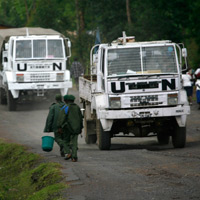
Current Situation
Recent U.S.-led efforts to end the crisis in the eastern Democratic Republic of Congo have yielded a ceasefire, but the conflict is not over, and the international community must follow through on recent progress with a comprehensive strategy for eastern Congo. Congolese women and girls in particular bear the vicious brunt of this crisis. The policies needed to better protect women and girls in Congo are closely linked to peacemaking and conflict prevention.
Ending the conflict will enable women and girls to participate in the healing and reconstruction of their families, communities and country.
Key Terms
Forces Armées de la République Démocratique du Congo (FARDC)—The Congolese Army is weak, ill-disciplined, and responsible for human rights abuses on a colossal scale
Joseph Kabila—President of the Democratic Republic of Congo
Laurent Nkunda—a dissident Congolese Tutsi General with at least 3,000 loyal forces that have carved out control of parts of North Kivu Province and commit grave human rights abuses
Rwandan Democratic Forces for the Liberation of Rwanda (FDLR)—a militia composed of more than 6,000 Rwandan Hutu rebels, many with links to the 1994 genocide in their home country
Rape as a Weapon of War
Rape as a weapon of war is causing the near total destruction of women, their families and their communities. When women’s economic activities are hindered by fear of sexual violence, women and their families suffer. It is not just armed groups that are guilty of rape; rapes committed by civilians are on the rise. Although the Congolese government modified their laws and penalties on rape, a culture of impunity exists because of the absence of a Congolese state.
Timeline of a Year of Conflict in the Congo
December 2006—Under the terms of a shaky truce, the Congolese Army and General Nkunda agreed to “mix” their forces and attack the FDLR; this led to a brutal counterinsurgency campaign and displaced hundreds of thousands of civilians
June 2007—The “mixing” collapsed and President Kabila rejected talks with Nkunda
November 2007—20,000 Congolese troops deployed
to North Kivu, and some units are aligned with the FDLR and other militias
December 2007—Congolese Army launched an offensive
against Nkunda and lost, causing even more civilian displacement; recent reports estimate nearly 170,000 people are living in camps in North Kivu
December 24, 2007—Nkunda declared a ceasefire acknowledging
the importance of an upcoming conference aimed at finding a political solution
A Communiqué, Ceasefire and Conference
The Nairobi Communiqué—On November 9, 2007, the governments of Congo and Rwanda released an agreement
with pluses and minuses that addresses the threat posed by the FDLR.
Goma Peace Conference—1500 people representing
civil society, armed groups and the Congolese government attended the Conference.
Ceasefire—After two weeks of bare-knuckled diplomacy, the Congolese government, ten armed groups from North Kivu, and 13 armed groups from South Kivu signed an agreement.
Now the Real Work Begins… A Comprehensive Strategy for Peace: The 3 P’s
Peacemaking
- Sustain the momentum- the US, EU, UN, and AU must formalize a “quartet” and establish full-time diplomatic teams based in the region that will maintain coordinated pressure on the parties to implement the ceasefire
- Maintain and consolidate the ceasefire- the quartet must work to ensure all parties adhere to the ceasefire and that there is support for demobilization and stabilization programs
- Focus on a basic “carrot and stick” approach to deal with the FDLR
Protection
- Increase MONUC presence in North and South Kivu and deploy forces where women and girls are most vulnerable in eastern Congo
- Use humanitarian and development funding to respond to and help prevent sexual violence
- The U.S. Senate must pass the International Violence Against Women Act (S. 2779)
Punishment
- Support the Congolese government in investigating, arresting and trying suspected criminals
- Open an International Criminal Court investigation
And the 4th P—Preventing Sexual Violence—support Security Sector Reform (SSR)—restructuring and training the military and police to more effectively secure the country.

